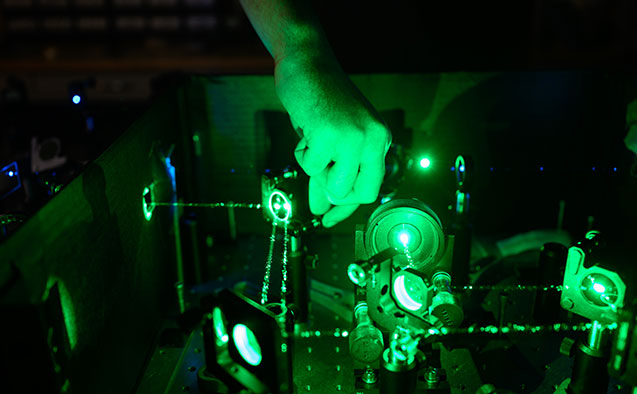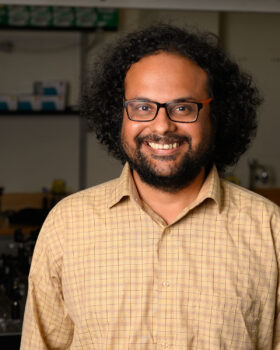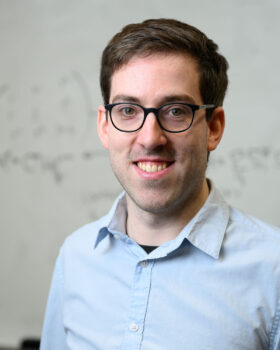Physics pioneers win NSF CAREER Awards
Two WFU professors granted $1M+ for research and education outreach

Assistant Professors of Physics Ajay Ram Srimath Kandada and Stephen M. Winter have each been granted National Science Foundation CAREER awards, which recognize the best and brightest talent in the United States. Together, the two grants total more than $1 million.
The five-year grants are awarded to junior faculty who exemplify the role of teacher-scholars through research and education.
“Winning these prestigious awards demonstrates Ajay and Steve’s early success and promise for even greater success in research, teaching and outreach. They are model teacher-scholars,” said Professor of Physics Dany Kim Shapiro, department chair and Harbert Family Distinguished Chair for Excellence in Teaching and Scholarship.

Ajay Ram Srimath Kandada
Kandada is a material physicist and spectroscopist. Winter focuses on theoretical condensed matter physics in the area of quantum materials. Both work within Wake Forest’s Center for Functional Materials. The Center provides a platform to connect a broad range of materials-focused research through research, education and outreach.
Physics is at the center of materials science as it provides a rationale for understanding the mechanical, thermal, optical and magnetic properties of matter. Kandada’s research focuses on quantum and ultrafast optical spectroscopy – looking at the light-matter interactions in materials relevant to optoelectronic technologies. “I see myself as a cameraman seeing inside of the material, but at extremely fast timescales,” he said. “If we want technology to be more efficient, we need to understand what is impeding the light-induced processes that happen in those timescales.”

Stephen M. Winter
Both Kandada and Winter focus on more accurate ways of predicting how the properties of materials behave. Ultimately, the research will help develop a deeper physical understanding of materials, which can subsequently lead to better and more efficient technologies.
As a theoretical physicist, Winter and his research team use high-performance computers, including Wake Forest University’s supercomputer, to predict the properties of materials where quantum mechanics plays an essential role. His work will elevate the utility of non-linear spectroscopy measurements – such as those employed in the Kandada lab – to probe complicated quantum materials.
“Steve and Ajay are pioneers in their respective fields, and their contributions will undoubtedly shape the future of science.” Wake Forest Baker Professor of Physics Oana Jurchescu
In addition to funding research work, the NSF grant provides funds for education.
A proposed new course at Wake Forest, which Kandada and Winter will collaborate on, teaches STEM students how to talk about their research so non-scientists can understand the importance of the work and its potential impact.
“Students don’t receive much formal education in soft skills and how to leverage what they learn to help others. You have to be a good educator and communicator of your work to the public to achieve the full benefits of science,” Winter said.
Kandada and Winter are also committed to bringing physics education to 9th and 10th graders. They will be creating course materials and building partnerships with local high schools to get younger teens from all backgrounds interested in physics.
“Both Ajay and Steve are not only brilliant researchers but also dedicated teachers and mentors,” said Jurchescu. “Their commitment to involving students in their research and to promoting STEM education in the community is truly commendable.”
Kandada and Winter join several past Wake Forest recipients of NSF CAREER Awards, including 2023 winners: Assistant Professor of Computer Science Minghan Chen for her research, “Towards a Living Neuron Twin for Improving Human Cognitive Health,” and Assistant Professor of Chemistry Elham Ghidiri for her work developing new laser techniques to discover and improve solar energy conversion devices that could help mitigate climate change.
Categories: Faculty, Teacher-Scholar, Top Stories
Wake Forest News
336.758.5237
media@wfu.edu
Meet the News Team
Headlines
Wake Forest in the News
Wake Forest regularly appears in media outlets around the world.




